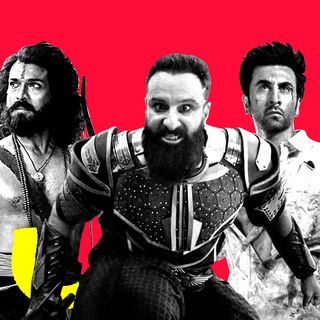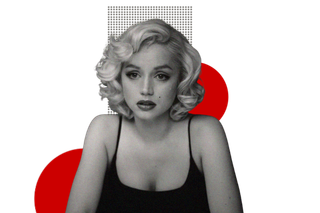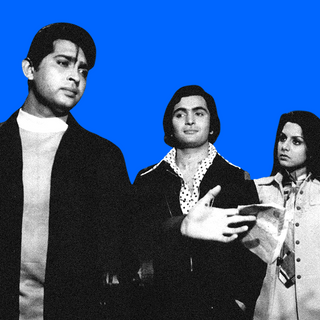
What Pop Culture’s Fixation With ‘Daddy Issues’ Is Really About
A deep psychological wound is turned into a sexualized parody of women’s pain.

A little over the halfway mark in Blonde, Ana De Armas’ Marilyn Monroe asks her husband, Arthur Miller, a question: “Am I your good girl, daddy?”
“Yeah, you’re my good girl darling,” comes the charmed reply.
There is nothing more beguiling to popular media than a woman with absent father figures. Nowhere is this more evident than in Netflix’s latest, Blonde — a fictionalized portrait of Marilyn Monroe’s life. In it, Ana de Armas plays Monroe as a woman whose whole life is haunted by the vacuum of a father she never knew. And when she sings, “Every Baby Needs a Da-Da-Daddy,” the script for how the rest of her life would play out is set — eternally in search of Daddy.
In a chilling rhythmic echo of Monroe’s song about daddy is Sylvia Plath’s poem, “Daddy”:
“At twenty I tried to die
And get back, back, back to you.“
Plath’s poem tells us the story of a woman struggling with the idea of her father, whom she barely remembers; in a death drive to catch up with him and confront what he represents. It’s preoccupied with the father figure in a way that pop culture, at large, is. But where it departs from the popular fixation on fathers is in how it’s about taking agency back, where society often tries to take it away. It also makes evident what, exactly, is awry with the way Marilyn Monroe is immortalized in pop culture as the primordial bombshell with daddy issues.
Related on The Swaddle:
Can We Move On: From the Woman Whose Childhood Trauma Is Used to Add ‘Depth’ to Her Character
Blonde is a fictional story, — which means creative licenses were taken. This included the decision to make Monroe call every man in her life “Daddy.” Through the gaze of a male director bent on turning Monroe’s life into a quest for daddy, the film does what most pop culture does to women in pain: turn them into sexualized caricatures. It turns vulnerability and a need for affirmation into a desire for a patriarch’s validation. Monroe blushes, giggles, and registers a girlish playfulness in her voice when talking to men — and in the process, all her life’s struggles are reduced to her search for masculine authority. Without it she’s hapless, lost, her body and image passed around as she increasingly dissociates from herself. This is the archetype of the “daddy issues girl” — and it’s one that converts women’s suffering under the patriarchy into a suffering wrought by the lack of a patriarch. “I think it’s more commonly pinned on women because it’s men doing the pinning,” says psychologist Jo Hemmings
The prurient gaze with which we’ve looked at young girls and women in crisis is telling of the ways we’ve erased their agency. Whether it’s when they’re aware of their sexuality, seeking tenderness and care, or are harmed in relationships with abusive men, it’s women who are always subsumed under the label of having “daddy issues.” And it’s why feminists in particular have always been associated with the label.
“… the loss of fathers has caused a tremendously debilitating and long-lasting psychic wound in America, and that a lot of what passed for political activism was often an attack on absent fathers,” wrote columnist Mark Judge, in a book decrying feminist movements. Judge isn’t the only one: he speaks to a larger cultural infantiliziation of feminists — condescending to them as women who simply need an authority figure, or who have had bad relationships with someone who should have been an authority figure. Any woman who isn’t sufficiently docile and compliant — who wasn’t sufficiently disciplined by the benevolent patriarch, in other words — has daddy issues.
“Many see this phrase as a way to minimize females’ attachment needs… When we talk about ‘daddy issues,’ it’s typically a way to dehumanize a woman’s needs or desires. Some people even use the term to slut-shame,” said Amy Rollo, a psychotherapist. This speaks to a deep-seated need to undermine women who express any kind of need at all: whether it be sexual, emotional, or physical. The only women left immune from the label, then, are women who are silent — and silenced. This is to say: all women are considered to have daddy issues, because “Daddy” himself is in a crisis. Coupled with the fear over women’s agency is the anxiety over the loss of traditional norms of masculinity. The “daddy issues” trope, then, is as much an indictment of changing masculinity as it is about feminism.
Related on The Swaddle:
Ana de Armas Expresses Concern About Nude Clips From ‘Blonde’ Spreading Online
“But if there is a romance between father and daughter, however repressed, and however culturally determined, why are we so intent on it being the daughter’s romance? We are alert to the daughter’s daddy issues; what of the father’s daughter issues?” asks Katherine Angel in Daddy Issues: Love and Hate in the Time of Patriarchy.
And it’s a pertinent question: think, for instance, of Donald Trump’s fixation on his own daughter, and his statement about how he’d date her if she weren’t his daughter. The father-daughter complex is political — but in fixing the cultural gaze on damaged daughters, we forget to hold men accountable for their tendency to seek romance with women much younger than they are. “It is usually invoked to scorn or mock a woman’s choice of sexual partner, whether due to his age, looks, status, or power; the suggestion is that she has fallen for a man who is a version of her father. The phrase admits this as a possibility, while denying and deriding it,” Angel notes.
Take Lolita — the classic underage femme fatale story whose pop culture presence has taken the shape of precocious young temptresses. But it’s really a story about a man who, in the guise of a father figure, violated the bond of trust instead of protecting it. But it’s always Lolita who remains the sexual siren all of 12 years old — Humbert Humbert himself is rarely immortalized as the distorted father who uses, abuses, and permanently damages someone. More disturbingly, popular culture as a whole has indeed adapted his gaze — it’s through his eyes that we view women in anguish and vulnerability, and it’s the same gaze with which Blonde depicts Marilyn Monroe’s trauma.
“Is it possible to get rid of the father, or is he forever internalized?” Angel further asks. He may not be internalized in daughters, so much as he is internalized in society itself — and how it treats the daughters it has collectively failed. There remains a day in the future when daughters can cast off the burden of damage and abandonment the way Plath did: “Daddy, daddy, you bastard, I’m through.”
Rohitha Naraharisetty is a Senior Associate Editor at The Swaddle. She writes about the intersection of gender, caste, social movements, and pop culture. She can be found on Instagram at @rohitha_97 or on Twitter at @romimacaronii.
Related


Most Employers Doubt Hybrid Workers’ Productivity, Study Suggests
